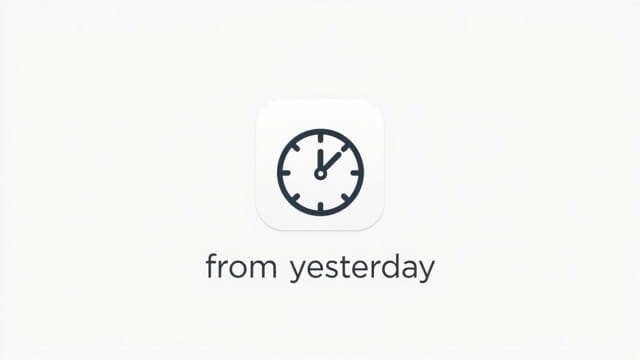Many English learners often get confused between phrases like ‘from yesterday’ and ‘since yesterday.’ These expressions seem similar at first glance, but they have different meanings and are used in different contexts. Understanding the distinction between these two can greatly improve your ability to express time clearly and correctly in everyday conversations, writing, and even in professional settings. Both phrases relate to time, but the way they function in a sentence can shift the meaning in subtle but important ways.
Understanding Time Expressions in English
The Importance of Time Prepositions
English uses a variety of prepositions to indicate time, including ‘since,’ ‘for,’ ‘from,’ and ‘until.’ Each one carries a specific nuance. In this case, ‘from yesterday’ and ‘since yesterday’ are both used to describe something that started in the past, but how they work grammatically and semantically is not the same. Learning to differentiate these phrases helps avoid common errors and makes your English sound more natural.
What Does From Yesterday Mean?
From yesterday is typically used when talking about a specific point in time when something started. It refers to a starting point in the past, usually followed by a second time reference or a description of a timeframe. This phrase often appears in instructions, schedules, or formal writing.
Examples:
- The new policy applies from yesterday until next week.
- She has been on leave from yesterday to today.
- From yesterday onwards, the office hours have changed.
As seen in these examples, from yesterday introduces the beginning of an event or period. It is frequently paired with another time phrase to show the duration or the continuation of that period.
When to Use Since Yesterday
On the other hand, since yesterday is used to describe something that began yesterday and is still continuing in the present. This phrase is often used with present perfect or present perfect continuous tenses. It highlights a state or an action that started in the past and is ongoing.
Examples:
- I have been feeling tired since yesterday.
- He hasn’t called me since yesterday.
- We have been working on this project since yesterday morning.
Since yesterday focuses on the continuity of an action or condition. It’s a key phrase used in describing ongoing states, which is why it is particularly common in conversations about how someone feels, ongoing problems, or current situations.
Key Grammar Differences
Verb Tenses
One of the easiest ways to know whether to use from yesterday or since yesterday is to look at the verb tense. Since yesterday is often used with:
- Present perfect:has/have + past participle
- Present perfect continuous:has/have been + verb-ing
In contrast, from yesterday can be used with a wider range of tenses, including simple past, present perfect, or even future (e.g., The rule will apply from yesterday to next Monday in a context that describes backdating).
Implied Duration
Since yesterday implies continuity. Whatever action or state you are describing hasn’t ended it began yesterday and is still happening now. From yesterday is more neutral and often implies that the period of time started in the past but may have already ended or is clearly defined.
Common Mistakes and How to Avoid Them
Incorrect Mixing of Tenses and Phrases
A common error is using since yesterday with past simple tense, which is grammatically incorrect. For example:
- Incorrect: I felt tired since yesterday.
- Correct: I have felt tired since yesterday.
Overlapping Contexts
Sometimes learners mix up from yesterday and since yesterday because in casual conversation, the nuance may not always change the overall message. However, for accurate English especially in exams, writing, and formal speech it is important to know the proper structure and intended meaning.
Using These Phrases in Different Contexts
Formal Contexts
In written or professional English, from yesterday is often used in legal documents, company announcements, and news topics. For example:
- All employees are required to wear ID badges from yesterday onward.
- The changes in the curriculum took effect from yesterday.
Everyday Conversation
In daily spoken English, since yesterday is more common when describing feelings, activities, or situations that began recently.
- I’ve had a headache since yesterday.
- We’ve been talking about that movie since yesterday!
Subtle Differences in Meaning
Although the phrases both involve ‘yesterday,’ their meanings shift subtly based on structure and purpose. For instance:
- From yesterday to todayindicates a complete time span.
- Since yesterdayimplies the action is still ongoing at the time of speaking.
These distinctions matter when you are trying to describe a situation accurately. A statement like The pain is from yesterday means it originated yesterday but may not be present now, while The pain has been there since yesterday suggests it continues into the present.
Tips for Mastering These Phrases
- Always pair since yesterday with present perfect or present perfect continuous tense.
- Use from yesterday when you are setting a clear timeframe, especially with start and end points.
- Think about whether the action is still continuing. If yes, use since. If not, consider from.
- Read and listen to native English materials like news reports, interviews, and podcasts to hear these phrases in real use.
Understanding the difference between from yesterday and since yesterday is a small but important step toward mastering English time expressions. By paying attention to verb tense, context, and the duration of the action, you can choose the correct phrase to express yourself clearly and effectively. With consistent practice, these expressions will become second nature, making your English sound smoother and more natural.
